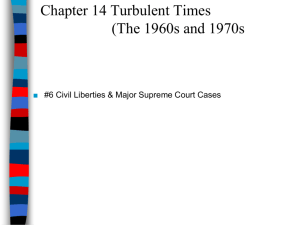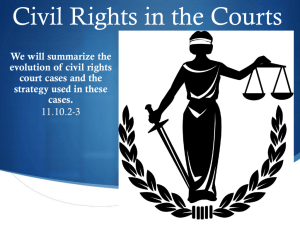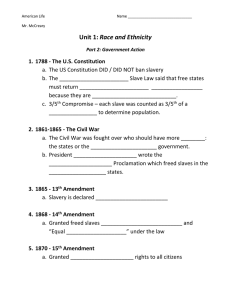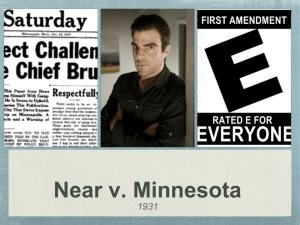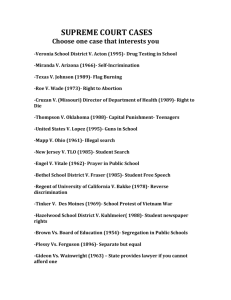* Wallace v. Jaffree
advertisement
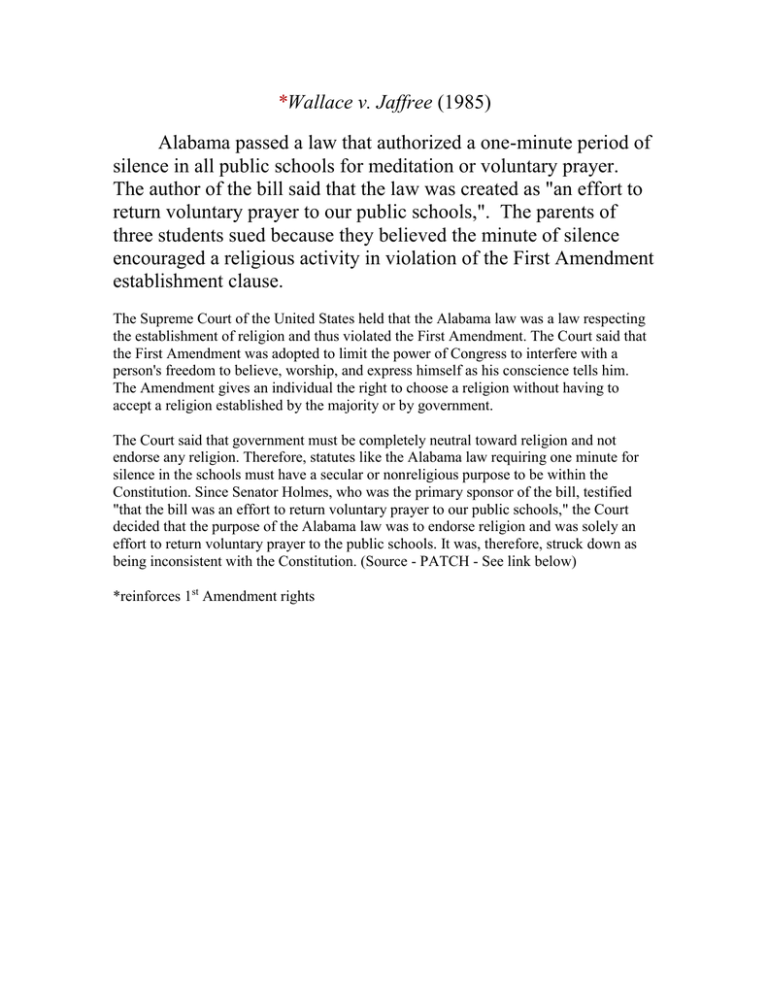
*Wallace v. Jaffree (1985) Alabama passed a law that authorized a one-minute period of silence in all public schools for meditation or voluntary prayer. The author of the bill said that the law was created as "an effort to return voluntary prayer to our public schools,". The parents of three students sued because they believed the minute of silence encouraged a religious activity in violation of the First Amendment establishment clause. The Supreme Court of the United States held that the Alabama law was a law respecting the establishment of religion and thus violated the First Amendment. The Court said that the First Amendment was adopted to limit the power of Congress to interfere with a person's freedom to believe, worship, and express himself as his conscience tells him. The Amendment gives an individual the right to choose a religion without having to accept a religion established by the majority or by government. The Court said that government must be completely neutral toward religion and not endorse any religion. Therefore, statutes like the Alabama law requiring one minute for silence in the schools must have a secular or nonreligious purpose to be within the Constitution. Since Senator Holmes, who was the primary sponsor of the bill, testified "that the bill was an effort to return voluntary prayer to our public schools," the Court decided that the purpose of the Alabama law was to endorse religion and was solely an effort to return voluntary prayer to the public schools. It was, therefore, struck down as being inconsistent with the Constitution. (Source - PATCH - See link below) *reinforces 1st Amendment rights McColloch v Maryland (1819) After the War of 1812, President James Madison determined that the country needed the services of a national bank to help fulfill its power. It created the Second Bank of the United States. Many states were unhappy about this because it competed with their own state banks. In an attempt to drive the Baltimore branch of the Bank of the United States out of business, the Maryland State Legislature required that all banks created outside of Maryland pay an annual tax of $15,000. There was a $500 penalty for each violation. James McCulloch, cashier of the Baltimore branch of the Bank of the United States, refused to pay the tax. Maryland took McColloch to court and said that it was their right as a state to tax any institution within their borders (company, person, etc), The Supreme Court affirmed McCulloch's position. This precedent established the superiority of the federal government. Reinforces federal power. *Goss v. Lopez (1975) Several public high school students (including D. Lopez) were suspended from school for misconduct but were not given a hearing before their suspension. School authorities in Columbus, Ohio, claimed that a state law allowed them to suspend students for up to ten days without a hearing. The students brought a legal action, claiming that the statute was unconstitutional because it allowed school authorities to deprive students of their right to a hearing, violating the due process clause of the 14th Amendment. The Supreme Court of the United States said that education is a property interest protected by the Fourteenth Amendment's due process clause and any suspension requires prior notice and a hearing. Permitting suspension without a hearing is, therefore, unconstitutional. The Court said that oral or written notice of the charges brought against a student must be given to the student who is being suspended for more than a trivial period. If he denies the charges, the student must be given a hearing. The hearing may be an informal one where the student is simply given an explanation of the evidence against him and an opportunity to tell his side of the story. (Source - PATCH - See link below) *reinforces due process *Hazelwood School District v. Kuhlmeier (1988) - Students Rights Kathy Kuhimeier and two other journalism students wrote articles on pregnancy and divorce for their school newspaper. Their teacher submitted page proofs to the principal for approval. The principal objected to the articles because he felt that the students described in the article on pregnancy, although not named, could be identified, and the father discussed in the article on divorce was not allowed to respond to the derogatory article. The principal also said that the language used was not appropriate for younger students. The principal told the students that they had to remove the articles from the paper before it could be distributed. The Supreme Court of the United States held that the Hazelwood School District did not violate the First Amendment right of the students. The Court ruled that School officials need not tolerate speech which is inconsistent with the school's basic educational mission. The Court distinguished this case from the Tinker decision (school officials could not punish students for wearing armbands in protest of the Vietnam war "students do not shed their constitutional rights at the schoolhouse gate") because the Tinker case involved a student's personal expression. This was, instead, a school newspaper, and as such could reasonably be perceived to bear the "imprimatur" of the school. They justified this because the publication of Spectrum was a part of the curriculum, i.e., it was in the curriculum guide as a part of the Journalism course, it was taught during school hours by a faculty member, the students received grades and academic credit, the faculty advisor exercised control over the publication, and the principal had to review it. The school's policies did not reflect an intent to expand the students' rights by converting a curricular newspaper into a public forum. The court further added that the principal's fears were reasonable: he was concerned that the students' identities could not be assured, that the privacy interests of boyfriends and parents were not adequately protected, and that parents mentioned in the divorce article were not given an opportunity to defend themselves. Reinforces freedom of press. Gideon v Wainwright (1963) Gideon was accused of breaking into a poolroom. Gideon, an ex con, was too poor to pay for a lawyer and asked the court to appoint one for him. The court refused to grant his request stating that lawyers were only provided for those accused of committing capital crimes like murder and rape. Gideon was tried and found guilty. While in prison Gideon hand wrote a plea to the Supreme Court arguing that his right to a fair trial was violated. Gideon's position was upheld. The Court ruled that all citizens must be provided a lawyer if they cannot afford one. This is regardless of the type of crime. *Reinforces rights of the accused. University of California Regents v Bakke (1976) Alan Bakke, an engineer with high grades, applied to several medical schools in the hopes of one day becoming a doctor. Bakke was rejected by all of the schools he applied to but the University of California at Davis encouraged him to apply again. The next year Bakke again applied and was again rejected. Bakke then found out that the University's affirmative action program reserved 17 places for minority candidates regardless of qualifications. Bakke sued the University claiming that he was the victim of "reverse discrimination" because less qualified minority students were admitted based on their race. The university argued that the creation of quotas was needed to ensure minority admission to college under their affirmative action program. In a two part ruling the court ordered Bakke to be admitted to medical school. The court ruled that Bakke had, in fact, been discriminated against. The court did, however, uphold the legality of affirmative action programs. The court cited Harvard Universities affirmative action program that created guidelines for admission rather than strict quotas. Reinforces civil rights. Dennis v. United States (1951) Eugene Dennis was a leader of the Communist Party in the United States between 1945 and 1948. He was arrested in New York for violation of Section 3 of the "Smith Act." The Act prohibited supporting the overthrow of the United States Government by force and violence. The government felt that the speeches made by Dennis presented a threat to national security. Dennis appealed his conviction to the Supreme Court of the United States, claiming that the Smith Act violated his First Amendment right to Free Speech. The Court found that the Smith Act did not violate Dennis' First Amendment right to free speech. Although free speech is a guaranteed right, itis not unlimited. The right to free speech may be lifted if the speech presents a clear and present danger to overthrow any government in the United States by force or violence. Since the speech made by Dennis advocated his position that the government should be overthrown, it represented a clear and present danger to the national security of the United States. (Source - PATCH - See link below). Reinforces ideas of free speech.
